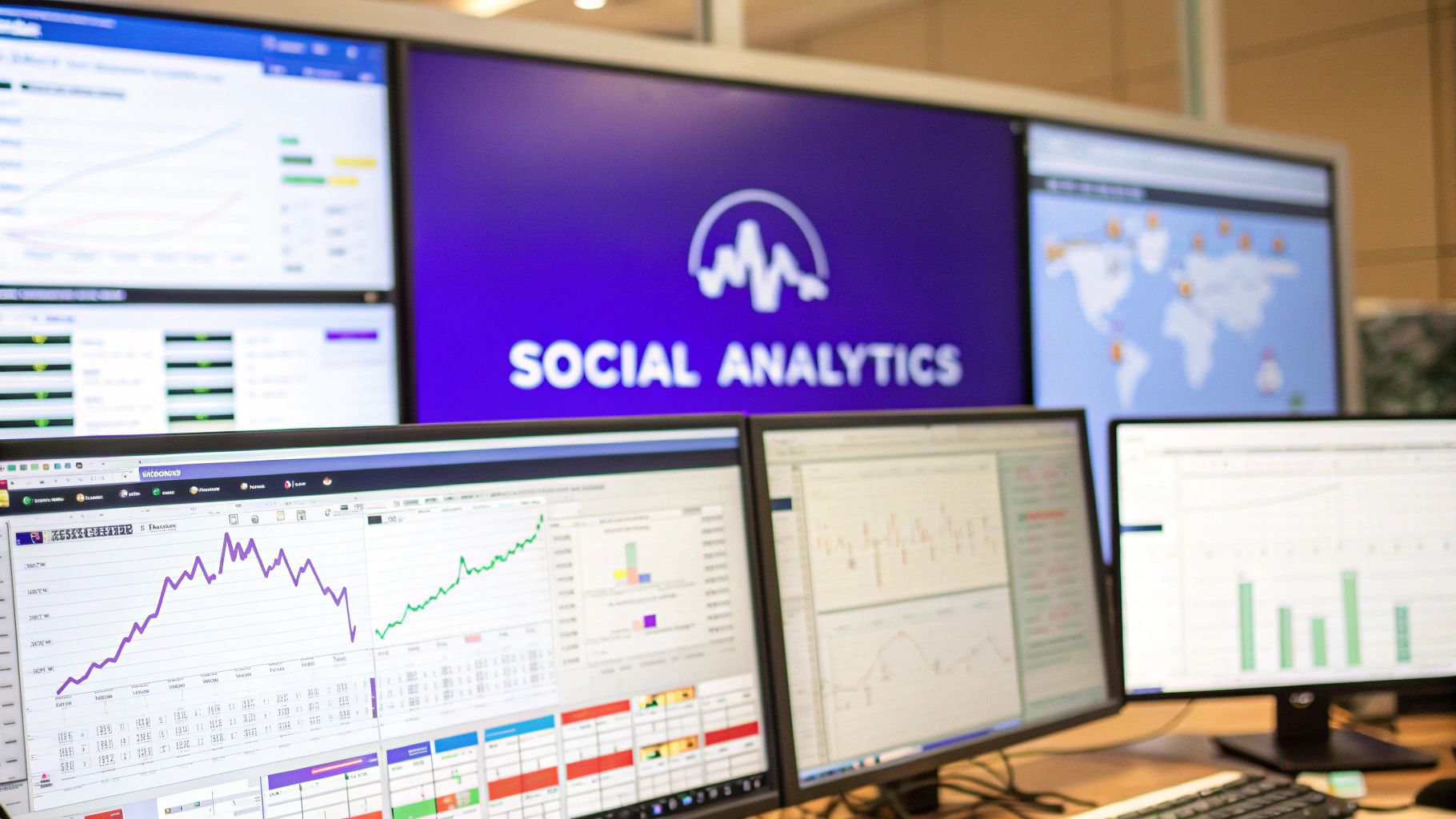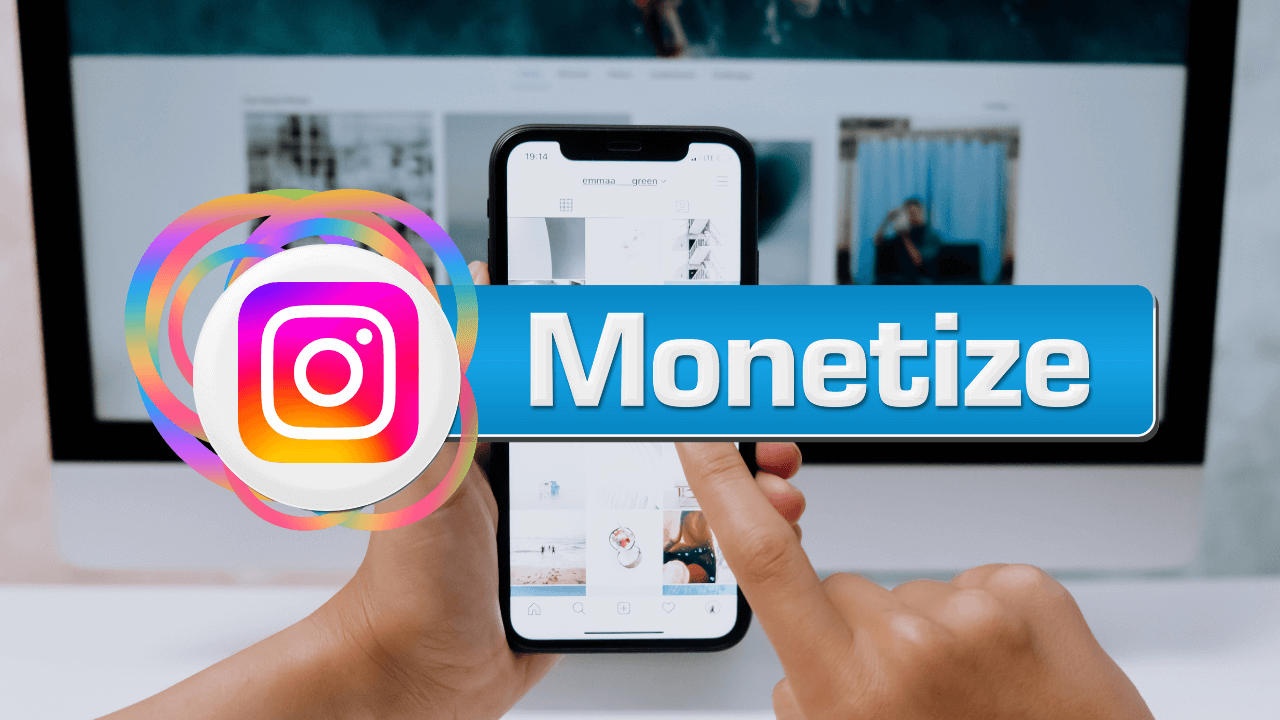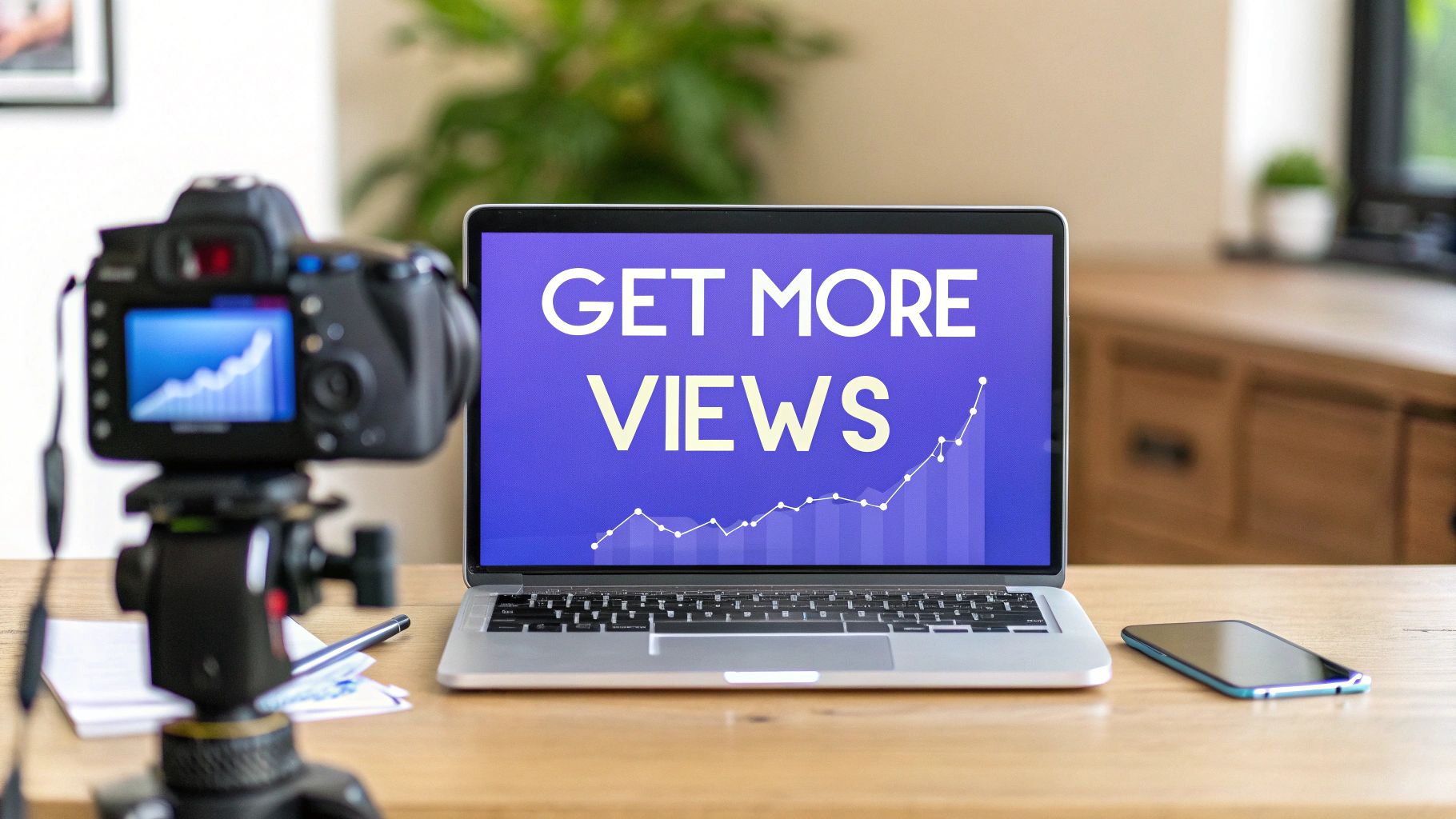In 2025, a successful social media presence hinges on data-driven decisions. While likes and follows offer a surface-level glimpse of engagement, they barely scratch the surface of what truly drives growth, revenue, and brand loyalty. To build a resilient and effective strategy, you must understand audience behavior, track campaign performance, and measure your return on investment (ROI) with precision.
This is where dedicated social media analytics tools become indispensable. They transform raw, complex data into actionable insights, helping you refine your content, optimize your posting schedule, and outperform your competition. Forget guesswork; it's time to unlock the strategic power of analytics to prove the value of your social efforts.
Navigating the crowded market for these platforms can be overwhelming. This guide is designed to simplify that process. We provide in-depth, honest assessments of the 12 best tools available, from comprehensive all-in-one suites like Sprout Social and Hootsuite to specialized solutions such as Rival IQ and Keyhole. For each platform, you'll find a detailed breakdown of its key features, pricing, pros, cons, and ideal use cases, complete with screenshots and direct links. Our goal is to equip you with the information needed to select the perfect tool that aligns with your specific budget, team size, and strategic objectives. Let's find the right fit for you.
1. PostSyncer
PostSyncer stands out as a powerful, AI-driven command center for social media management, making it an exceptional choice for those seeking robust social media analytics tools integrated with comprehensive management features. It centralizes content creation, scheduling, and performance tracking across unlimited social profiles, including major platforms like Instagram, TikTok, and LinkedIn. This makes it a scalable solution for solo creators, growing agencies, and large enterprises alike.
What truly distinguishes PostSyncer is its intelligent automation. The platform’s AI-powered scheduling analyzes audience behavior to automatically publish content at times of peak engagement, removing guesswork and maximizing reach. Its analytics suite provides deep insights into performance metrics and competitive analysis, enabling users to craft data-informed strategies. The collaborative features, including a drag-and-drop visual calendar and customizable approval workflows, are designed to maintain brand consistency and streamline team coordination, a crucial element for agencies managing multiple client accounts.
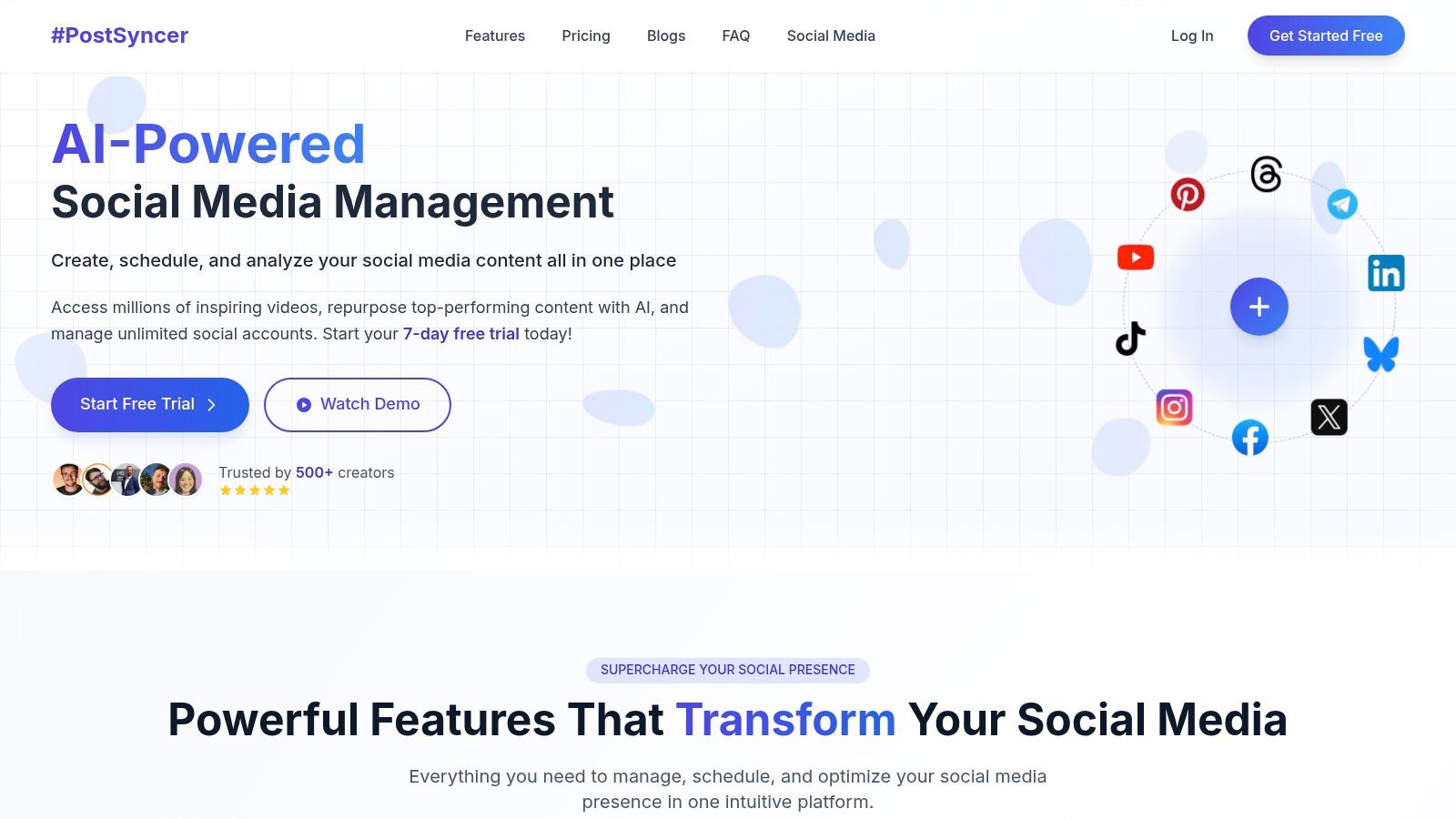
Key Features & Use Cases
- AI-Optimized Scheduling: Automatically determines the best times to post for each social profile, ideal for marketers looking to boost organic engagement without manual analysis.
- Comprehensive Analytics: Track key performance indicators, monitor competitors, and generate detailed reports. This is perfect for agencies needing to demonstrate ROI to clients or for brands refining their content strategy.
- Unlimited Social Profiles: Manage an uncapped number of accounts from a single dashboard, a critical feature for digital marketing agencies with diverse client portfolios.
- AI Content Studio: Generate content ideas and captions effortlessly, which is invaluable for solo creators or small teams facing creative blocks or time constraints.
Pricing and Plans
PostSyncer offers transparent and flexible pricing. The Starter plan is just $9/month, catering to individual creators, while the Pro plan at $49/month provides advanced AI tools and collaboration features for businesses and teams. A 7-day free trial is available, allowing you to test its capabilities before committing.
| Pros | Cons |
|---|---|
| AI-powered scheduling maximizes engagement by choosing optimal posting times. | Some advanced AI features, like video creation, are still in development. |
| Supports unlimited social accounts, perfect for agencies and multi-brand managers. | The Pro plan's cost may be a consideration for creators on a very tight budget. |
| Robust collaboration tools and customizable approval workflows. |
Best for: Digital marketing agencies, SMEs, and solo creators looking for a comprehensive, AI-enhanced platform that combines powerful analytics with efficient management tools.
Website: postsyncer.com
2. Sprout Social
Sprout Social positions itself as an all-in-one social media management platform, but its strength truly lies in its comprehensive analytics and reporting suite. It excels at transforming raw social data into actionable business intelligence, making it one of the premier social media analytics tools for businesses that need to prove ROI and refine their strategy. The platform integrates publishing, engagement, and analytics, providing a unified workflow for marketing teams.
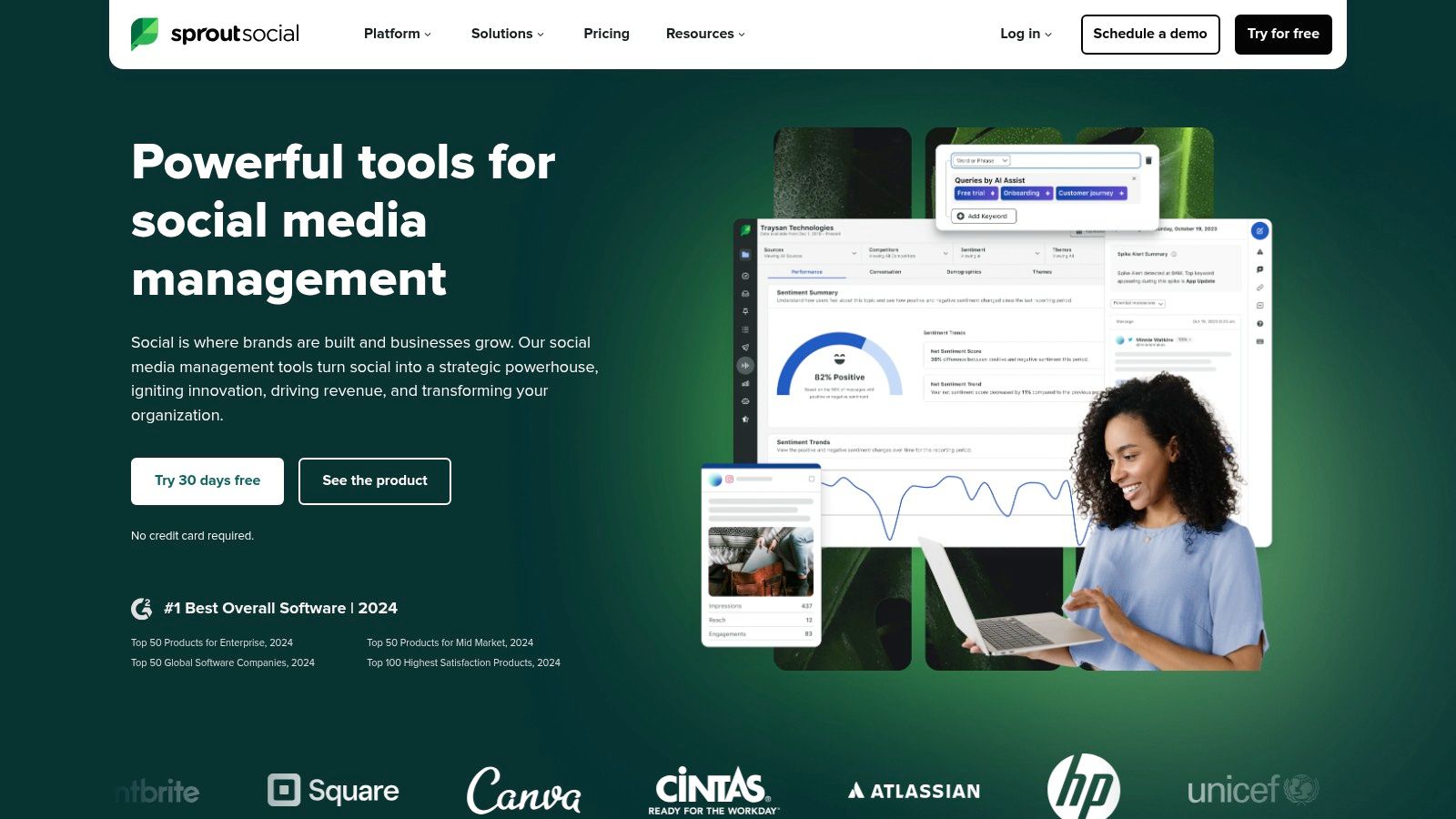
What sets Sprout Social apart is its focus on presentation-ready reports and team-based analytics. Users can track everything from individual post performance to high-level competitive analysis with ease. The platform's social listening tools are also robust, allowing brands to tap into broader industry conversations, not just direct mentions. This combination of deep data analysis and market intelligence provides a holistic view of a brand's social presence.
Platform Breakdown
| Feature | Details |
|---|---|
| Best For | Agencies and mid-to-large businesses needing integrated analytics and team collaboration. |
| Pricing | Starts at $249/month for the Standard plan. Higher tiers add advanced features. |
| Pros | User-friendly interface, extensive and customizable reporting, excellent customer support. |
| Cons | Higher price point, premium analytics and listening features are locked in pricier plans. |
For more details, visit the official website: https://sproutsocial.com/
3. Hootsuite
Hootsuite is one of the most established names in social media management, and its analytics capabilities are a core reason for its longevity. It provides a centralized dashboard for scheduling, monitoring, and analyzing performance across numerous social networks. For users juggling many accounts, its strength lies in consolidating data into a single, comprehensive view, making it a reliable choice among social media analytics tools for streamlined reporting.
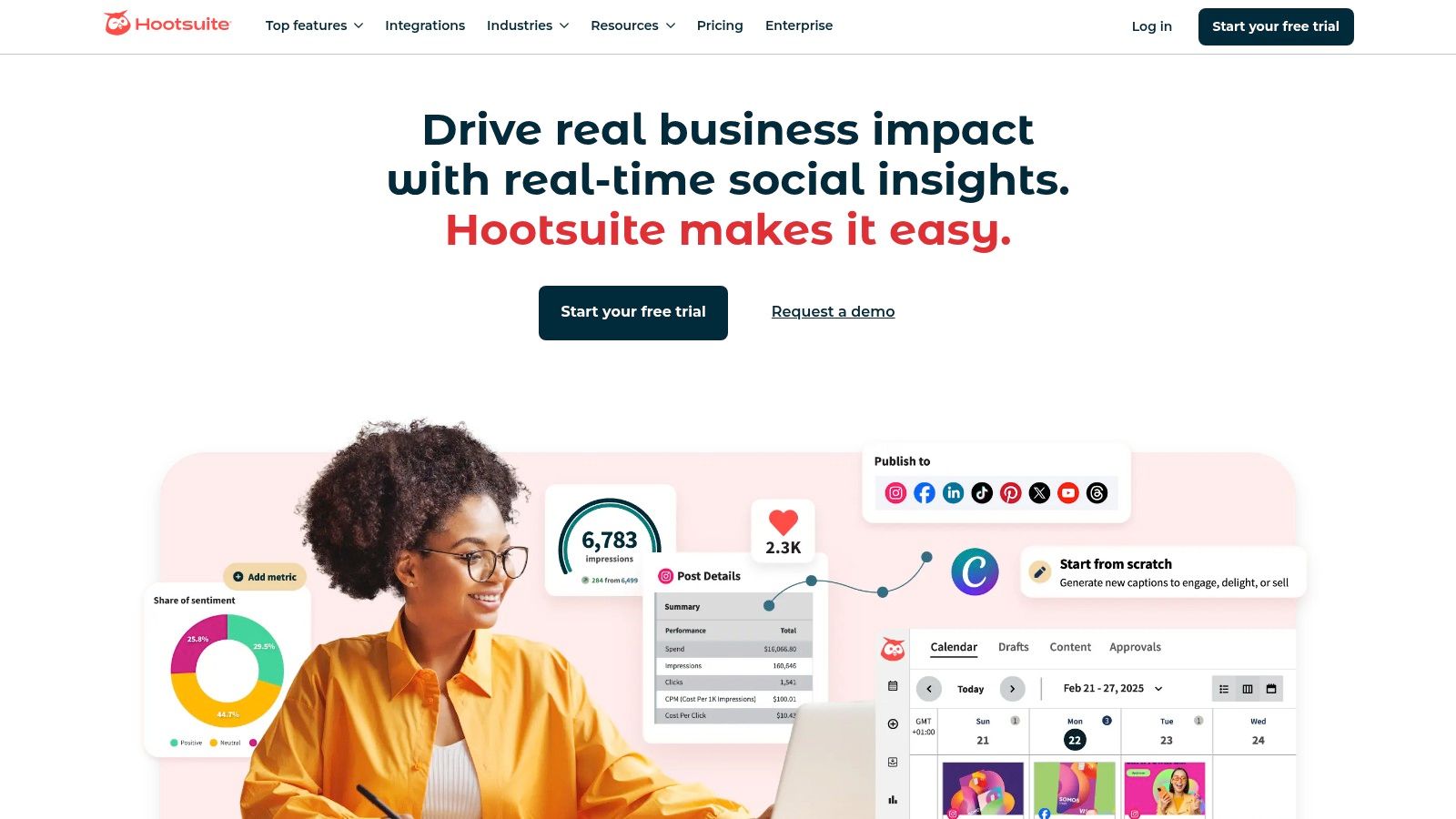
What sets Hootsuite apart is its extensive library of app integrations, allowing users to customize their dashboard with tools like Trello, Slack, or specialized analytics apps. This flexibility means you can build a bespoke analytics hub tailored to your specific workflow. While its interface can feel dense to new users, the platform offers detailed reporting on key metrics, team performance, and ROI, providing the data needed to justify social media spend and guide strategic decisions.
Platform Breakdown
| Feature | Details |
|---|---|
| Best For | Individuals, SMBs, and agencies managing multiple social profiles and needing extensive integrations. |
| Pricing | Starts at $99/month for the Professional plan. Team and Business plans offer more features. |
| Pros | Supports a wide range of social media platforms, extensive third-party app integrations, flexible plans. |
| Cons | The user interface can be less intuitive for beginners, advanced analytics require higher-tier plans. |
For more details, visit the official website: https://hootsuite.com/
4. Buffer
Buffer is widely known for its streamlined social media scheduling, but it also offers a suite of straightforward analytics that make it an excellent entry point for individuals and small businesses. It strips away the complexity often associated with data analysis, presenting key metrics in a clean, digestible format. This focus on simplicity makes it one of the most accessible social media analytics tools for those who need core insights without a steep learning curve or overwhelming feature set.
What makes Buffer stand out is its commitment to an uncluttered user experience. The platform provides essential performance data, such as reach, engagement rates, and follower growth, alongside post-by-post analytics. While it lacks the deep social listening or competitive analysis of more advanced platforms, its strength lies in providing clear, actionable feedback on your content strategy. It's perfectly suited for users whose primary goal is to understand what's working and refine their publishing schedule accordingly, all within an affordable and intuitive environment.
Platform Breakdown
| Feature | Details |
|---|---|
| Best For | Individuals, small businesses, and beginners needing simple scheduling and basic analytics. |
| Pricing | Offers a free plan for basic publishing. Paid plans with analytics start at $6/month per channel. |
| Pros | Clean and intuitive interface, affordable pricing plans, easy to use for beginners. |
| Cons | Limited analytics in lower-tier plans, lacks advanced features like social listening. |
For more details, visit the official website: https://buffer.com/
5. Brandwatch
Brandwatch is a powerhouse in consumer intelligence, extending far beyond typical social media management. It excels at deep social listening and analytics, allowing enterprises to tap into a vast ocean of online conversations, identify market trends, and understand consumer sentiment on a global scale. While it offers publishing and engagement, its core strength lies in turning unstructured data from millions of sources into strategic insights, making it one of the most advanced social media analytics tools available.
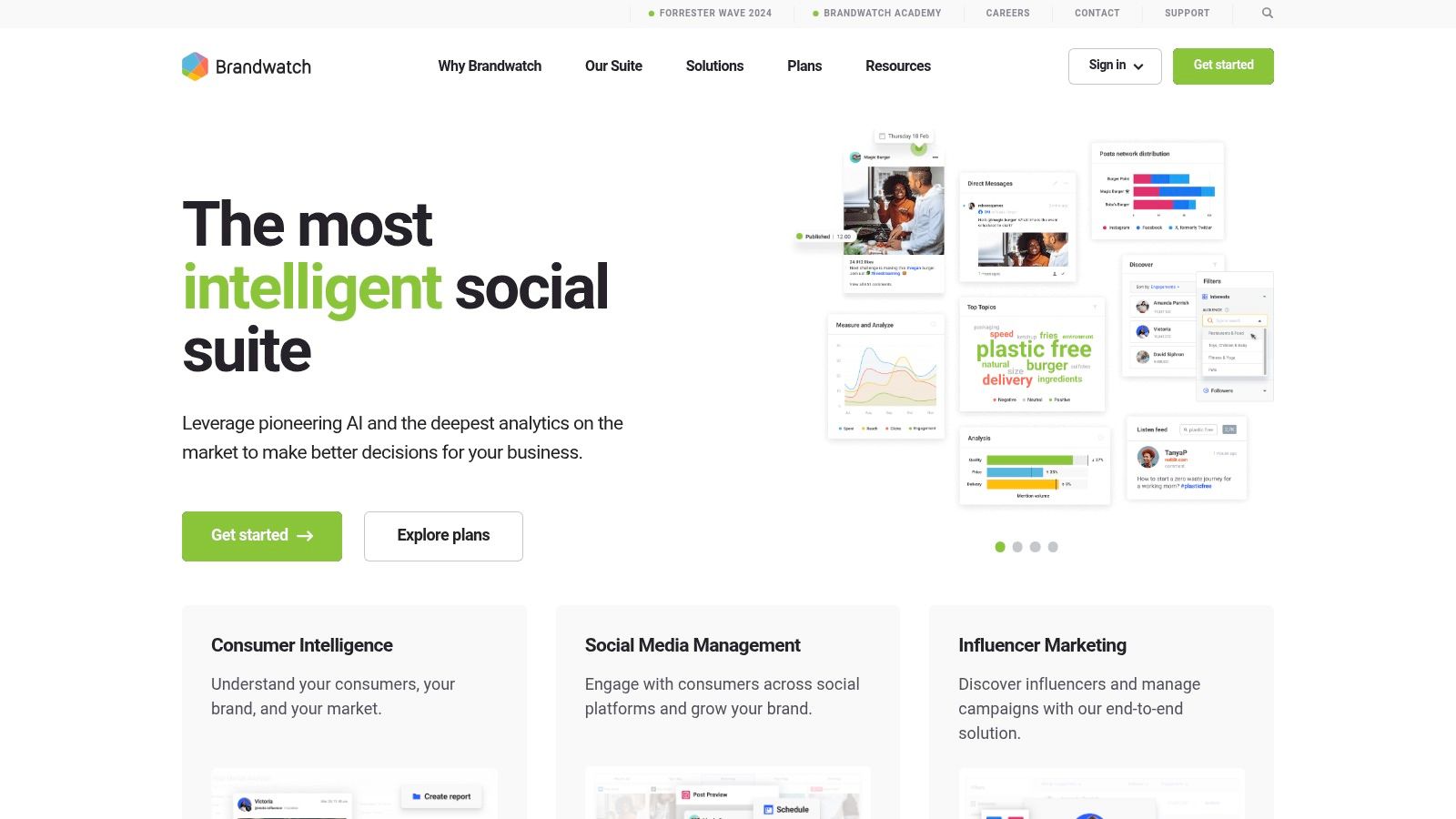
What truly distinguishes Brandwatch is its robust consumer research platform, which combines social data with surveys to provide a multi-layered view of an audience. The platform’s flexible dashboards and powerful data visualization tools help large teams and agencies track brand health, conduct competitive benchmarking, and manage potential crises in real-time. This focus on comprehensive market intelligence helps businesses make data-driven decisions that impact more than just their social media strategy. The detailed analytics are also crucial for anyone trying to learn how to measure social media ROI effectively.
Platform Breakdown
| Feature | Details |
|---|---|
| Best For | Enterprise-level brands and large agencies needing deep consumer intelligence and market research. |
| Pricing | Custom pricing based on needs; plans are generally in the premium-to-enterprise range. |
| Pros | Powerful and extensive social listening capabilities, highly customizable dashboards, strong competitive analysis features. |
| Cons | High price point makes it inaccessible for smaller businesses, can have a steep learning curve due to its complexity. |
For more details, visit the official website: https://www.brandwatch.com/
6. Zoho Social
Zoho Social stands out as a highly accessible platform, especially for small businesses and solo entrepreneurs who need robust social media management without a hefty price tag. Part of the broader Zoho business suite, it offers a powerful combination of scheduling, monitoring, and analytics. It’s one of the most practical social media analytics tools for users already invested in the Zoho ecosystem, as it integrates seamlessly with Zoho CRM to link social activity directly to sales and customer relationships.
The platform's strength lies in its simplicity and efficiency. It delivers key performance metrics through clean, easy-to-understand dashboards and reports. Users can track audience growth, engagement patterns, and post performance across all major networks. While it may not offer the deep, granular data of enterprise-level competitors, it provides more than enough insight to inform strategy, demonstrate value, and optimize content for budget-conscious teams. Its user-friendly interface makes it an excellent entry point into data-driven social media marketing.
Platform Breakdown
| Feature | Details |
|---|---|
| Best For | Small to medium-sized businesses and users of the Zoho CRM looking for affordable analytics. |
| Pricing | Starts at $10/month (billed annually) for the Standard plan. A free plan is also available. |
| Pros | Affordable pricing plans, user-friendly interface, seamless integration with Zoho ecosystem. |
| Cons | Limited advanced features compared to competitors, some users report occasional glitches. |
For more details, visit the official website: https://www.zoho.com/social/
7. HubSpot Social Media
HubSpot's offering is less a standalone product and more a crucial component of its all-encompassing marketing and sales platform. Its power lies in connecting social media performance directly to business outcomes like leads and customers. For businesses already invested in the HubSpot ecosystem, it’s one of the most effective social media analytics tools because it closes the loop between social engagement and CRM data, demonstrating tangible ROI from your social efforts.
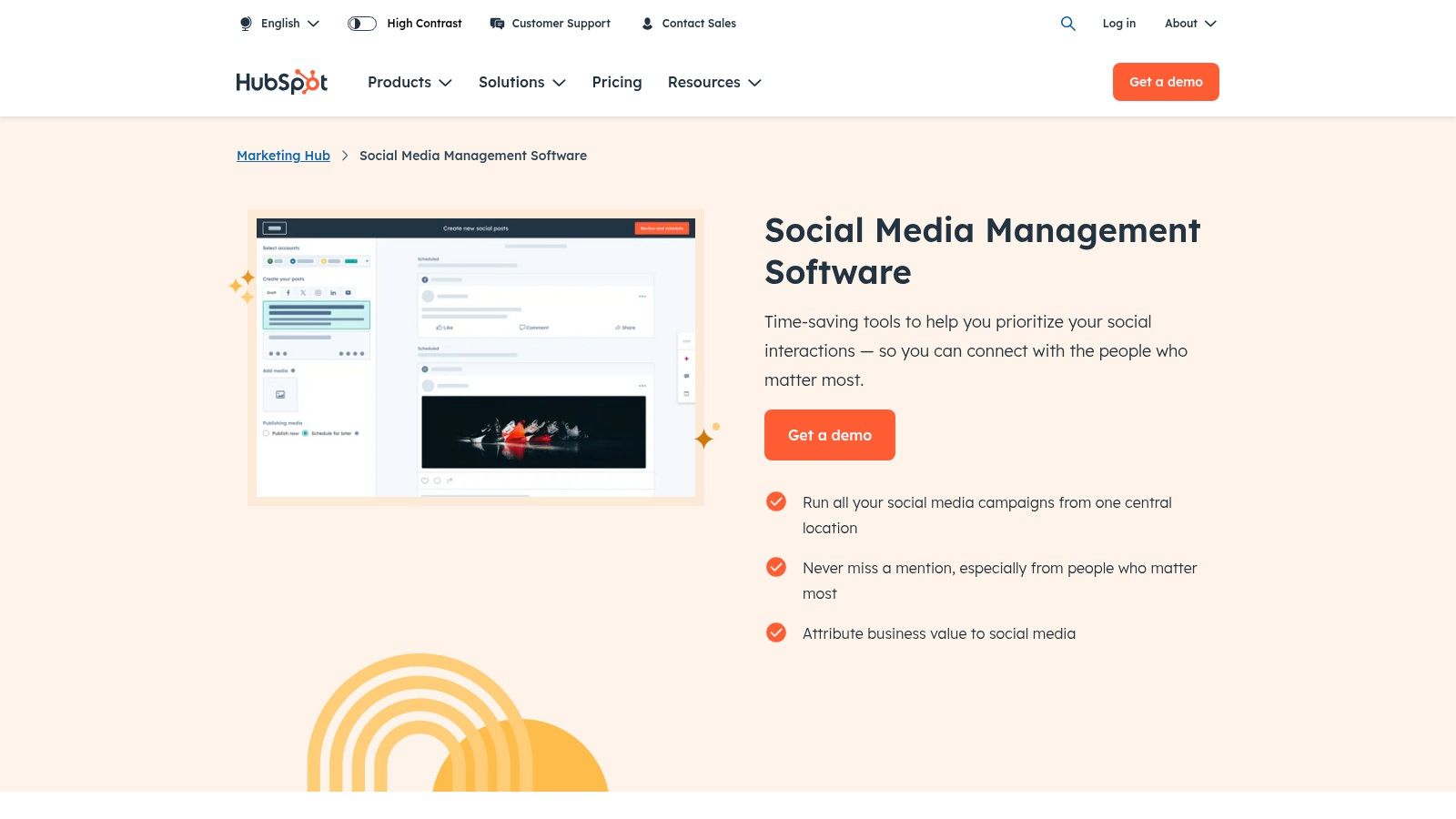
What makes HubSpot unique is its ability to attribute website traffic and lead generation directly to specific social media posts. While other tools focus purely on social metrics, HubSpot ties social analytics into the entire customer journey. You can monitor brand mentions, schedule content, and analyze performance, all while seeing how those activities impact your sales pipeline within the same interface. This integrated approach provides a holistic view that is difficult for dedicated social tools to replicate.
Platform Breakdown
| Feature | Details |
|---|---|
| Best For | B2B companies and businesses already using the HubSpot CRM that want to link social data to sales. |
| Pricing | Included in the Marketing Hub, starting at $800/month (Professional plan). |
| Pros | Seamless integration with the HubSpot ecosystem, directly ties social media to revenue, user-friendly interface. |
| Cons | Expensive for those not needing the full marketing suite, analytics are less granular than specialized tools. |
For more details, visit the official website: https://www.hubspot.com/products/marketing/social-inbox
8. Rival IQ
Rival IQ carves out its niche by focusing almost exclusively on competitive intelligence. While many platforms offer competitor tracking as a feature, Rival IQ builds its entire suite around it, making it one of the most powerful social media analytics tools for brands obsessed with outperforming their rivals. It excels at benchmarking performance, deconstructing competitor content strategies, and delivering alerts on significant market shifts, providing a clear picture of the competitive landscape.
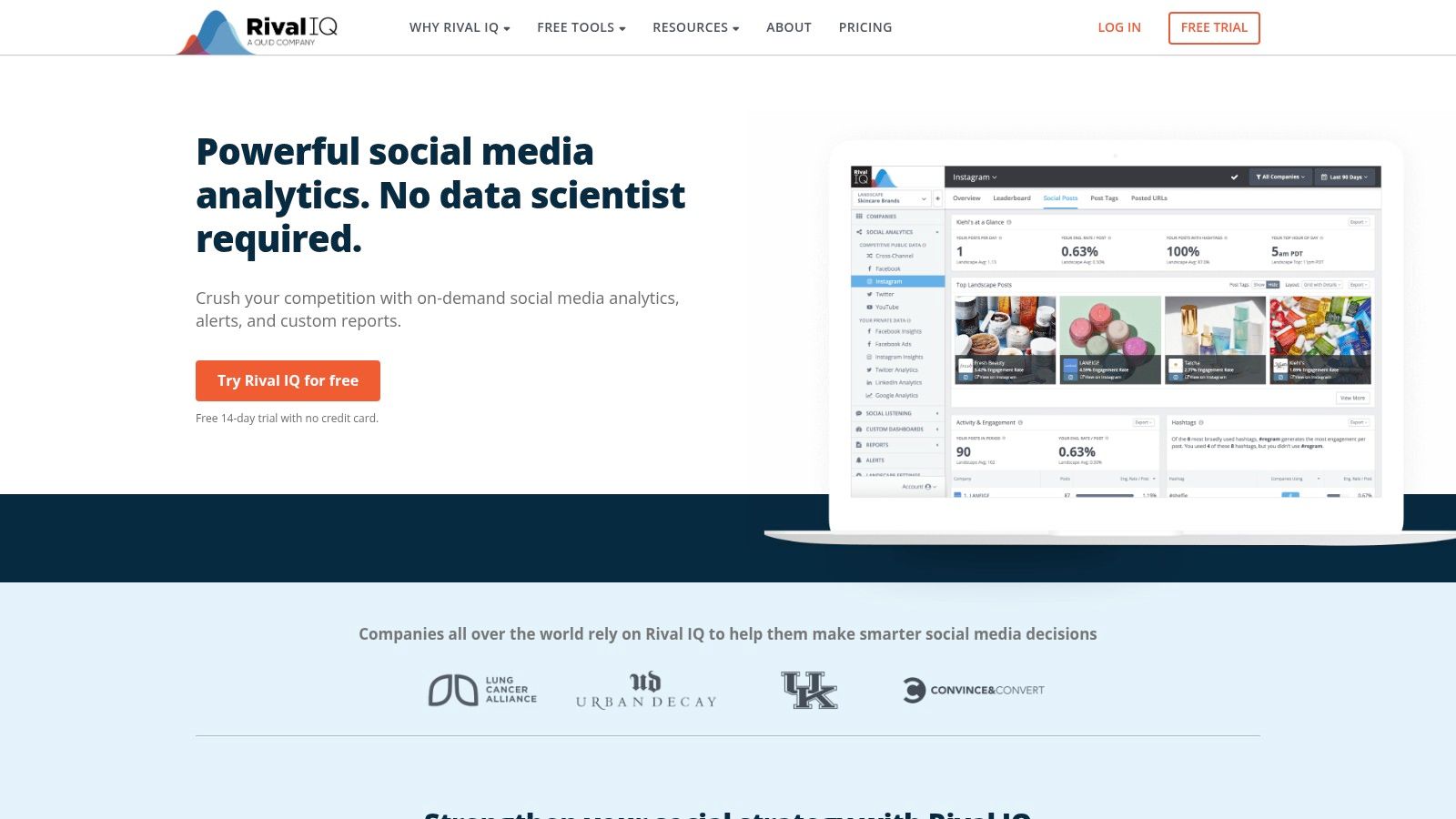
What truly sets Rival IQ apart is its ability to automatically analyze and report on competitor activity across multiple channels. The platform identifies top-performing content, posting frequency, and engagement patterns, allowing you to see exactly what’s working for others and adapt your strategy accordingly. The customizable dashboards and automated alerts ensure you never miss a critical move, from a viral post to a change in advertising spend. Learn more about how to leverage these features with our guide on social media competitor analysis tools.
Platform Breakdown
| Feature | Details |
|---|---|
| Best For | Marketers and agencies focused on competitive benchmarking and strategy. |
| Pricing | Starts at $239/month for the Drive plan. Higher tiers add more advanced features. |
| Pros | In-depth competitive analysis, user-friendly interface, comprehensive reporting features. |
| Cons | Higher price point, limited integrations with other marketing platforms. |
For more details, visit the official website: https://www.rivaliq.com/
9. Keyhole
Keyhole excels in real-time tracking and reporting, making a name for itself with powerful hashtag and keyword analytics. While many platforms offer broad analytics, Keyhole is one of the best social media analytics tools for monitoring the immediate impact of campaigns, events, and brand-relevant conversations as they unfold. It simplifies the process of measuring buzz and understanding the velocity of a trend across major social networks.
What truly distinguishes Keyhole is its laser focus on campaign-specific data. The platform allows users to track the performance of specific hashtags, keywords, or accounts with high precision, providing metrics like reach, impressions, and top influencers in real-time. This granular, live insight is invaluable for marketers who need to make quick, data-driven decisions during a product launch or live event. Its influencer tracking and competitive analysis features further enhance its utility for performance-focused brands.
Platform Breakdown
| Feature | Details |
|---|---|
| Best For | Brands and agencies needing real-time campaign, hashtag, and event tracking. |
| Pricing | Custom pricing based on needs. Plans typically start around $199/month, with higher tiers for more features. |
| Pros | Excellent real-time data tracking, user-friendly interface, comprehensive reporting features. |
| Cons | Higher pricing compared to some competitors, can have limited integrations with other marketing tools. |
For more details, visit the official website: https://keyhole.co/
10. Emplifi
Emplifi offers a powerful, enterprise-grade suite focused on enhancing customer engagement and providing deep relationship insights through its social media tools. It excels at unifying marketing, commerce, and care teams under one platform, making it a strong choice for large organizations aiming to create a cohesive customer experience. The platform's analytics capabilities are designed to measure content performance, track audience engagement, and monitor brand health across all major social channels.
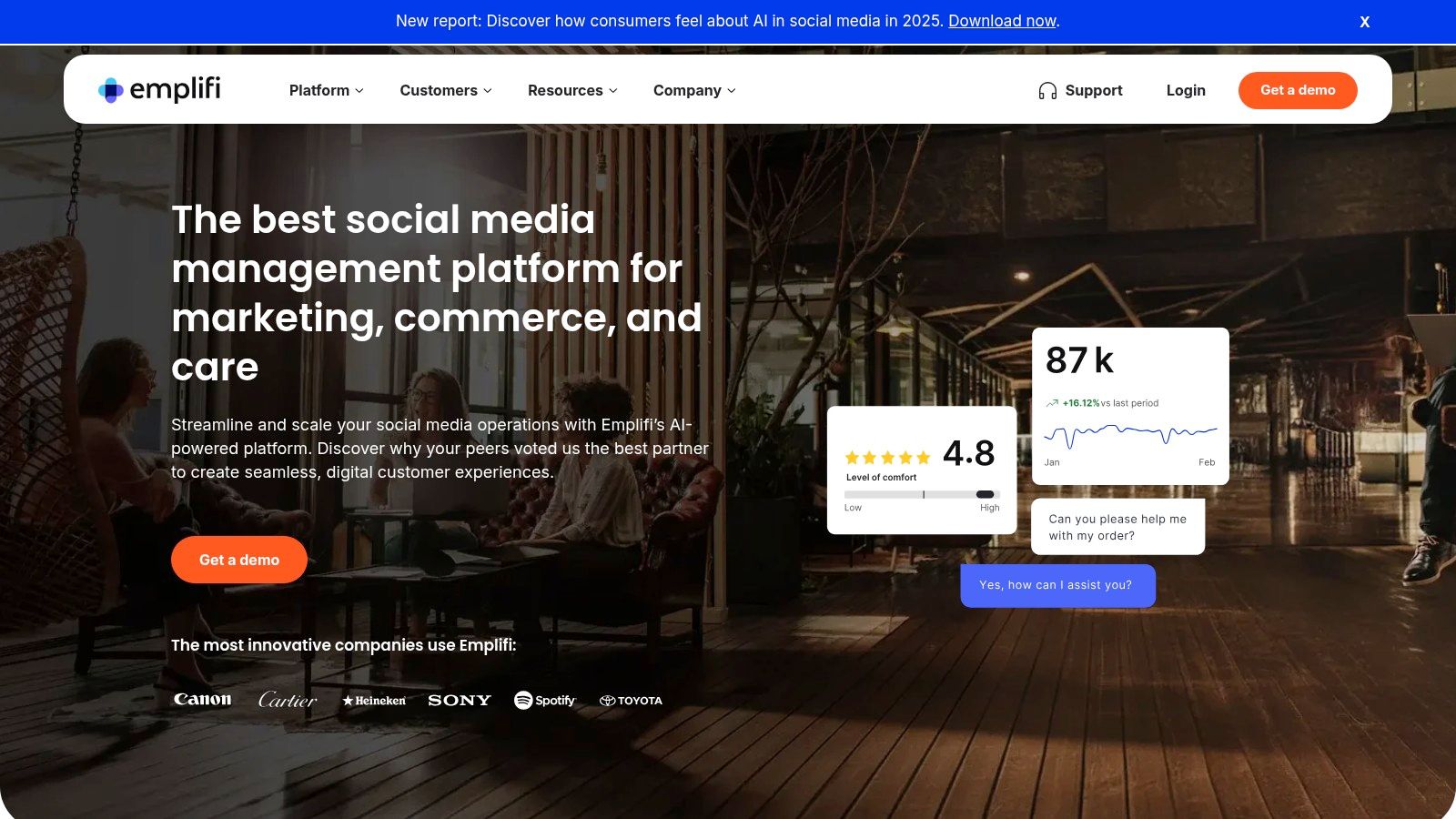
What distinguishes Emplifi is its ability to connect social media performance directly to business outcomes, from marketing ROI to customer care efficiency. Its social listening and monitoring features are particularly robust, allowing brands to analyze competitor strategies and understand broader industry trends. As one of the more comprehensive social media analytics tools, it’s built for enterprises that need to manage complex, multi-brand portfolios and require a scalable solution for tracking extensive customer interactions and content performance.
Platform Breakdown
| Feature | Details |
|---|---|
| Best For | Large enterprises and B2C brands needing an integrated customer experience platform. |
| Pricing | Custom pricing based on specific needs; requires contacting sales for a quote. |
| Pros | Comprehensive suite of tools, strong social listening, user-friendly interface. |
| Cons | Higher price point makes it less accessible for smaller businesses, some users report occasional glitches. |
For more details, visit the official website: https://emplifi.io/
11. Social Status
Social Status carves out its niche by offering clean, straightforward analytics with a strong emphasis on competitor benchmarking and influencer campaign tracking. It's designed for users who need clear, actionable data without the complexity or high cost of enterprise-level suites. For agencies and brands focused on performance reporting, this platform delivers insights that are easy to digest and share with stakeholders. It stands as one of the most accessible social media analytics tools for proving campaign value and tracking market position.
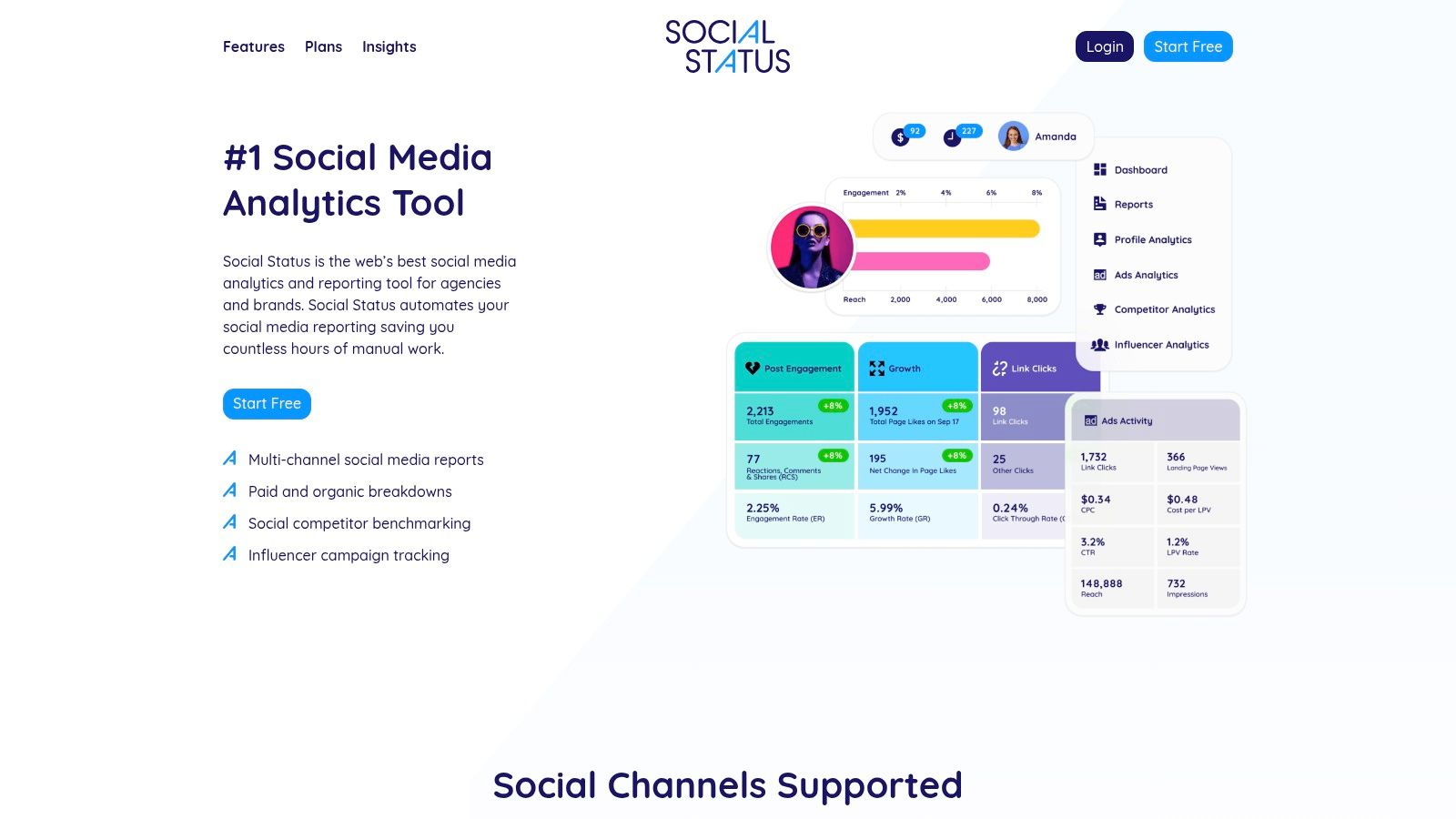
What makes Social Status particularly useful is its dedicated functionality for tracking influencer marketing ROI and analyzing competitor strategies side-by-side. While some advanced platforms bundle these features into expensive add-ons, Social Status integrates them into its core offering. This allows even smaller teams to access sophisticated competitive intelligence and measure the direct impact of influencer collaborations, making data-driven decisions more attainable. The focus is less on all-in-one management and more on pure, effective performance analysis.
Platform Breakdown
| Feature | Details |
|---|---|
| Best For | Agencies and SMBs needing affordable, clear reporting with a focus on competitor and influencer analytics. |
| Pricing | Offers a free plan for basic use. Paid plans start at $29/month for the Starter plan. |
| Pros | User-friendly interface, comprehensive reporting features, affordable pricing plans. |
| Cons | Limited advanced features compared to competitors, some users report occasional glitches. |
For more details, visit the official website: https://www.socialstatus.io/
12. Supermetrics
Supermetrics isn't a traditional dashboard; it's a powerful data integration tool that automates the flow of marketing data into the reporting environment you already use. It bridges the gap between scattered social media platforms and your central analytics hub, like Google Sheets, Looker Studio, or a data warehouse. This makes it one of the most flexible social media analytics tools for data-savvy marketers who need to blend social metrics with other business data for a complete performance picture.
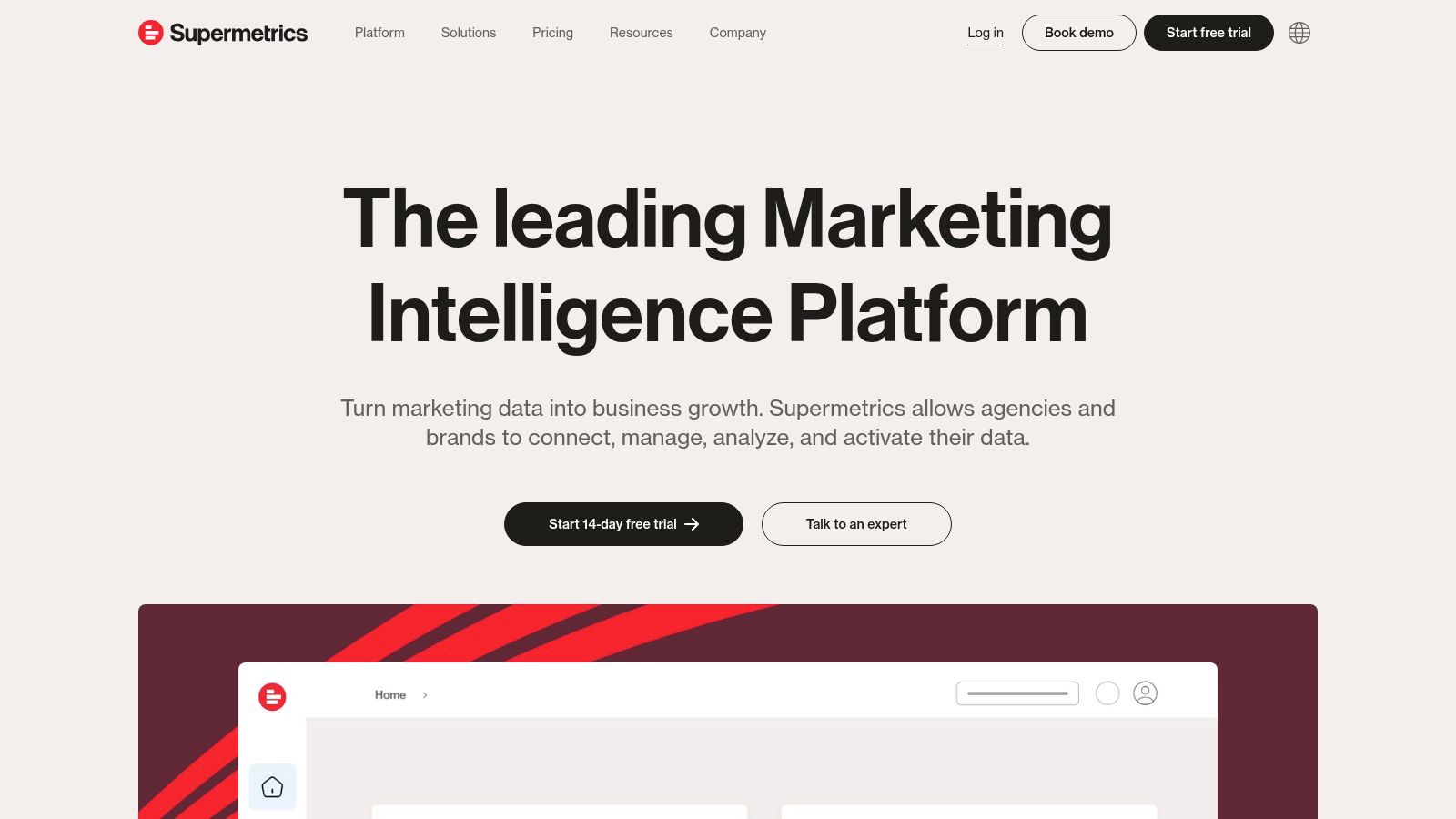
What truly distinguishes Supermetrics is its focus on eliminating manual data-pulling. Instead of exporting CSVs from each social network, it automates data delivery directly into your chosen destination, ready for analysis. This is invaluable for agencies managing multiple clients or in-house teams needing to consolidate cross-channel campaign data. It allows for the creation of truly custom dashboards that go far beyond what any single platform can offer, providing a unified view of your marketing funnel. This approach transforms how you can leverage data, as highlighted in this overview of social media reporting tools.
Platform Breakdown
| Feature | Details |
|---|---|
| Best For | Data-driven marketing teams and agencies needing to consolidate multi-platform data. |
| Pricing | Varies by destination; for example, the Looker Studio connector starts at $99/month. |
| Pros | Connects to over 150 sources, eliminates manual data entry, highly customizable reporting. |
| Cons | Can be expensive, and some users report occasional glitches with data connectors. |
For more details, visit the official website: https://supermetrics.com/
Top 12 Social Media Analytics Tools Comparison
| Platform | Core Features & Unique Selling Points | User Experience & Quality ★ | Target Audience 👥 | Value & Pricing 💰 | Highlights 🏆 / Notes |
|---|---|---|---|---|---|
| PostSyncer 🏆 | AI-powered scheduling ✨, unlimited profiles, collaborative workflows, multi-video | ★★★★☆ Robust & intuitive | Creators, agencies, SMEs, enterprise teams | Starter $9/mo, Pro $49/mo, no hidden fees 💰 | Cutting-edge AI features, transparent pricing, 7-day free trial |
| Sprout Social | In-depth analytics, social listening, CRM integration | ★★★★☆ User-friendly | Mid-large businesses, marketing teams | Higher pricing 💰 | Strong analytics & CRM, steep learning curve |
| Hootsuite | Scheduling, monitoring, extensive integrations | ★★★☆☆ Flexible but less intuitive UI | Multi-platform managers, agencies | Flexible plans 💰 | Broad integrations, UI can be complex |
| Buffer | Simple scheduling, basic analytics, browser extension | ★★★☆☆ Clean & intuitive | Beginners, small teams | Affordable 💰 | Easy to use, limited advanced analytics |
| Brandwatch | Advanced analytics, listening, competitive benchmarking | ★★★★☆ Comprehensive | Large teams, agencies | Higher pricing 💰 | Powerful tools, occasional publishing issues |
| Zoho Social | Scheduling, analytics, social listening, Zoho CRM integration | ★★★☆☆ User-friendly | Budget-conscious, Zoho users | Affordable 💰 | Seamless Zoho integration, fewer advanced features |
| HubSpot Social Media | Scheduling, analytics, social listening, marketing automation integration | ★★★★☆ Smooth integration | HubSpot ecosystem users | Higher pricing 💰 | Great marketing combo, analytics less deep |
| Rival IQ | Competitive analysis, benchmarking, content tracking | ★★★★☆ User-friendly | Brands monitoring competitors | Higher pricing 💰 | In-depth competitive insights |
| Keyhole | Hashtag/keyword tracking, influencer, real-time monitoring | ★★★☆☆ Real-time insights | Campaign managers, marketers | Higher pricing 💰 | Real-time data focus |
| Emplifi | Analytics, customer engagement, content performance | ★★★★☆ Comprehensive & supported | Enterprises | Higher pricing 💰 | Strong support, occasional glitches |
| Social Status | Analytics, competitor & influencer tracking | ★★★☆☆ User-friendly | Agencies, budget-conscious teams | Affordable 💰 | Affordable & simple, fewer advanced features |
| Supermetrics | Data integration, automated reporting | ★★★★☆ User-friendly | Data-driven marketers, analysts | Higher pricing 💰 | Automates data imports to BI tools |
Choosing the Right Analytics Tool for Your Brand
Navigating the crowded market of social media analytics tools can feel overwhelming, but making an informed choice is a critical step toward transforming your social strategy. As we've explored, the "best" tool isn't a one-size-fits-all solution. It's the one that aligns precisely with your unique goals, team structure, and budget. The right platform moves you beyond surface-level vanity metrics and empowers you to make data-driven decisions that generate tangible business outcomes.
Key Takeaways for Making Your Decision
To distill this comprehensive guide into actionable steps, focus on a few core principles. First, clarify your primary objective. Are you focused on deep competitive intelligence like the kind Rival IQ or Brandwatch provides? Or do you need a robust, all-in-one content management and analytics hub like Sprout Social or Hootsuite for a large team? Solo creators and small businesses might find the streamlined, cost-effective features of Buffer or Zoho Social more than sufficient for their needs.
Second, consider your existing tech stack. If you're already embedded in the HubSpot ecosystem, its social media tool offers seamless integration. Similarly, if your primary need is funneling data into business intelligence dashboards, a connector like Supermetrics is purpose-built for the job. Don't underestimate the power of a tool that fits neatly into your current workflow, as this reduces friction and encourages team adoption.
A Practical Framework for Selection
Before committing to a subscription, create a personalized checklist based on these crucial factors:
- Team Size and Collaboration: How many users need access? Do you require sophisticated approval workflows and task-assignment features? Platforms like Emplifi and Sprout Social are designed for complex team structures.
- Budgetary Constraints: Be realistic about your budget. While enterprise-level tools offer powerful features, there are excellent, budget-friendly social media analytics tools like PostSyncer and Zoho Social that deliver significant value.
- Essential Features: Identify your non-negotiables. Is it advanced AI-powered listening, influencer identification, or simply beautiful, client-ready reporting? Pinpoint the 3-5 features that will have the most significant impact on your strategy.
- Scalability: Choose a tool that can grow with you. Will your needs change in the next 12-24 months? Select a platform with tiered plans that allow you to scale up features as your brand or agency expands.
As you evaluate these platforms, remember that many are integrating sophisticated AI to deliver predictive insights and automate analysis. The reliability of these AI models is becoming a crucial differentiator. For those interested in the underlying technologies that power these features, exploring resources on LLM monitoring tools can provide valuable context on ensuring AI performance and accuracy.
Ultimately, the most effective way to validate your choice is through hands-on experience. Take advantage of free trials and schedule live demos. Prepare a list of specific questions and use cases to test each platform against your real-world challenges. By investing the time to find the right fit, you equip your brand with the insights needed to not just participate in the conversation but to lead it.
Ready to turn analytics into action without the complexity? PostSyncer combines powerful AI-driven scheduling, in-depth analytics, and an intuitive interface into one affordable platform. Start your free trial today and discover how easy it is to manage and measure your social media success. Visit PostSyncer to learn more.
